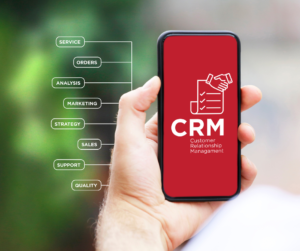Introduction
Customers have more choices than ever before, and their loyalty hinges on a positive experience. This is where a Customer Relationship Management (CRM) system comes in.
A CRM system is more than just a glorified contact list. It’s a powerful tool that can revolutionize the way you interact with your customers, personalize their experience, and ultimately, drive long-term business success.

Here are 5 key ways a CRM system can transform your customer relationships:
1. A Single Source of Customer Truth
Gone are the days of scattered spreadsheets and siloed information. A CRM system provides a centralized platform to store and manage all your customer data, creating a single source of truth. This includes:
- Contact details: Names, email addresses, phone numbers, and other essential contact information.
- Purchase history: Track past purchases, identify buying patterns, and personalize future recommendations.
- Communication history: Maintain a chronological record of all interactions with each customer, including emails, calls, meetings, and notes.
- Customer preferences: Store information about customer preferences, interests, and communication channels to ensure personalized outreach.
By having all this information at your fingertips, your sales, marketing, and customer service teams can gain a holistic view of each customer. This allows them to:
- Personalize interactions: Tailor your communication and marketing messages based on individual customer preferences and purchase history.
- Provide exceptional customer service: Equip your customer service team with the information they need to resolve issues quickly and efficiently.
- Identify upsell and cross-sell opportunities: Leverage purchase history to identify opportunities to recommend complementary products or services.
A centralized customer data platform fosters collaboration across your organization, ensuring a consistent and positive customer experience throughout their entire journey with your brand.

2. Streamlined Sales Pipeline Management
A well-defined sales pipeline is the backbone of any successful sales strategy. A CRM system empowers you to manage your sales pipeline effectively, allowing you to:
- Visualize your pipeline: Gain a real-time overview of your sales progress through customizable dashboards and reports.
- Track deal progress: Move potential deals through pre-defined sales stages, monitor progress, and identify potential roadblocks.
- Prioritize leads: Utilize lead scoring features to identify high-value leads and prioritize your sales efforts.
- Improve forecasting: Leverage historical sales data and pipeline insights to make informed sales forecasts and set realistic goals.
By streamlining your sales pipeline management with a CRM system, you can optimize lead conversion rates, close more deals faster, and ultimately, boost your sales revenue.
3. Automated Lead Nurturing and Conversion
In today’s digital age, nurturing leads is crucial for converting them into loyal customers. A CRM system with lead nurturing functionalities allows you to:
- Automate nurturing campaigns: Set up automated email sequences and personalized messages to engage with potential customers at the right time in their buying journey.
- Segment your audience: Tailor your communication based on demographics, interests, and online behavior to ensure relevant and engaging content.
- Track lead engagement: Monitor how leads interact with your emails and marketing materials to assess their level of interest.
- Identify sales-ready leads: Utilize lead scoring to pinpoint leads most likely to convert and prioritize outreach from your sales team.
By automating lead nurturing campaigns within your CRM, you can nurture leads more efficiently, improve conversion rates, and shorten your sales cycle.
4. Enhanced Customer Service and Support
By enabling your customer service team to deliver efficient and personalized support, a CRM system fosters customer satisfaction and loyalty. Additionally, features like:
- Customer satisfaction surveys: Gather feedback from customers after interactions to identify areas for improvement.
- Sentiment analysis: Analyze customer communication for sentiment to proactively address issues and improve overall customer experience.
These features empower you to gather valuable customer feedback and continuously improve your customer service processes.

5. Data-Driven Insights for Better Decision Making
Data is the lifeblood of any successful business strategy. A robust CRM system provides you with a wealth of data and analytics to gain valuable insights into your customer interactions, sales performance, and marketing effectiveness. Key functionalities include:
- Track key performance indicators (KPIs): Monitor critical metrics such as customer satisfaction scores, lead conversion rates, sales pipeline progression, and customer lifetime value.
- Generate custom reports: Create customized reports to analyze specific aspects of your business and identify areas for improvement.
- Identify trends: Utilize the data collected through your CRM to identify trends in customer behavior, buying patterns, and marketing campaign performance.
By leveraging the reporting and analytical capabilities of your CRM, you can make data-driven decisions about your sales and marketing strategies, optimize your customer service operations, and ensure your business remains competitive in the marketplace.
Conclusion
Investing in a CRM system is an investment in your customer relationships. By implementing a CRM with the functionalities outlined above, you can:
- Gain a single source of truth for all customer data.
- Streamline your sales pipeline management.
- Automate lead nurturing and conversion processes.
- Deliver exceptional customer service and support.
- Make data-driven decisions to optimize your business strategy.
Ultimately, a CRM system empowers you to build stronger customer relationships, drive sales growth, and achieve sustainable business success.

Choosing the Right CRM for Your Business
With a vast array of CRM solutions available, selecting the right one for your specific needs is crucial. Here are some key factors to consider:
- Industry-specific features: Certain CRMs cater to specific industries and offer specialized functionalities.
- Scalability: Choose a CRM that can grow and adapt alongside your business.
- Budget: CRM solutions come in various price ranges. Determine your budget and find a solution that offers the features you need at a reasonable cost.
- Ease of use: The CRM should be user-friendly and intuitive for your team to adopt seamlessly.
By carefully considering these factors, you can choose a CRM system that empowers your team, streamlines your operations, and drives long-term business success.
CloudTech ERP: Your Trusted Partner in Customer Relationship Management
CloudTech ERP offers a comprehensive suite of cloud-based CRM solutions designed to cater to the needs of businesses of all sizes. Our user-friendly CRM systems are packed with powerful features to help you manage your customer interactions, personalize their experience, gain valuable customer insights, and ultimately, build stronger customer relationships.
Contact CloudTech ERP today to learn more about how our CRM solutions can transform your customer relationships and drive your business forward.





